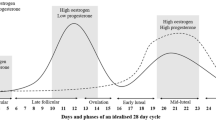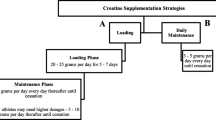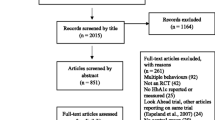Abstract
Background
Understanding of the impact of an acute bout of exercise on hormones involved in appetite regulation may provide insight into some of the mechanisms that regulate energy balance. In resting conditions, acylated ghrelin is known to stimulate food intake, while hormones such as peptide YY (PYY), pancreatic polypeptide (PP) and glucagon-like peptide 1 (GLP-1) are known to suppress food intake.
Objective
The objective of this review was to determine the magnitude of exercise effects on levels of gastrointestinal hormones related to appetite, using systematic review and meta-analysis. Additionally, factors such as the exercise intensity, duration and mode, in addition to participant characteristics, were examined to determine their influence on these hormones.
Data Sources
Major databases (PubMed, Scopus, Google Scholar, Science Direct, Academic Search Premier and EBSCOHost) were searched, through February 2013, for original studies, abstracts, theses and dissertations that examined responses of appetite hormones to acute exercise.
Study Selection
Studies were included if they evaluated appetite hormone responses during and in the hours after an acute bout of exercise and reported area under the concentration–time curve (AUC) values for more than three datapoints. Studies reporting mean or pre/post-values only were excluded.
Study Appraisal and Synthesis
Initially, 75 studies were identified. After evaluation of study quality and validity, using the Physiotherapy Evidence Database scale, data from 20 studies (28 trials) involving 241 participants (77.6 % men) had their data extracted for inclusion in the meta-analyses. A random-effects meta-analysis was conducted for acylated ghrelin (n = 18 studies, 25 trials) and PYY (n = 8 studies, 14 trials), with sub-group analyses and meta-regressions being conducted for moderator variables. Because the number of studies was limited, fixed-effects meta-analyses were performed on PP data (n = 4 studies, 5 trials) and GLP-1 data (n = 5 studies, 8 trials).
Results
The results of the meta-analyses indicated that exercise had small to moderate effects on appetite hormone levels, suppressing acylated ghrelin (effect size [ES] Cohen’s d value −0.20, 95 % confidence interval [CI] −0.373 to −0.027; median decrease 16.5 %) and increasing PYY (ES 0.24, 95 % CI 0.007 to 0.475; median increase 8.9 %), GLP-1 (ES 0.275, 95 % CI −0.031 to 0.581; median increase 13 %), and PP (ES 0.50, 95 % CI 0.11 to 0.89; median increase 15 %). No significant heterogeneity was detected in any meta-analysis (using Cochrane’s Q and I 2); however, publication biases were detected for all analyses. No moderator variables were observed to moderate the variability among the studies assessing acylated ghrelin and PYY.
Limitations
The majority of the present literature is acute in nature; therefore, longer-term alterations in appetite hormone concentrations and their influence on food and beverage intake are unknown. Furthermore, our review was limited to English-language studies and studies reporting AUC data.
Conclusions
An acute bout of exercise may influence appetite by suppressing levels of acylated ghrelin while simultaneously increasing levels of PYY, GLP-1 and PP, which may contribute to alterations in food and drink intake after acute exercise. Further longitudinal studies and exploration into mechanisms of action are required in order to determine the precise role these hormones play in long-term appetite responses to an exercise intervention.





Similar content being viewed by others
References
Murphy KG, Bloom SR. Gut hormones and the regulation of energy homeostasis. Nature. 2006;444(7121):854–9. doi:10.1038/nature05484.
Karra E, Batterham RL. The role of gut hormones in the regulation of body weight and energy homeostasis. Mol Cell Endocrinol. 2010;316(2):120–8. doi:10.1016/j.mce.2009.06.010.
Chaudhri OB, Salem V, Murphy KG, Bloom SR. Gastrointestinal satiety signals. Annu Rev Physiol. 2008;70:239–55. doi:10.1146/annurev.physiol.70.113006.100506.
Stanley S, Wynne K, McGowan B, Bloom S. Hormonal regulation of food intake. Physiol Rev. 2005;85:1131–58. doi:10.1152/physrev.00015.2004.
Delhanty PJ, Neggers SJ, van der Lely AJ. Mechanisms in endocrinology: ghrelin. The differences between acyl- and des-acyl ghrelin. Eur J Endocrinol. 2012;167(5):601–8. doi:10.1530/EJE-12-0456.
Ghigo E, Broglio F, Arvat E, Maccario M, Papotti M, Muccioli G. Ghrelin: more than a natural GH secretagogue and/or an orexigenic factor. Clin Endocrinol (Oxf). 2005;62(1):1–17. doi:10.1111/j.1365-2265.2004.02160.x.
Wren AM, Seal LJ, Cohen MA, Brynes AE, Frost G, Murphy KG, et al. Ghrelin enhances appetite and increases food intake in humans. J Clin Endo Metab. 2001;86(12):5992–5.
De Vriese C, Perret J, Delporte C. Focus on the short- and long-term effects of ghrelin on energy homeostasis. Nutrition. 2010;26(6):579–84. doi:10.1016/j.nut.2009.09.013.
Holst JJ. The physiology of glucagon-like peptide 1. Physiol Rev. 2007;87(4):1409–39. doi:10.1152/physrev.00034.2006.
Holz GG, Chepurny OG. Glucagon-like peptide-1 synthetic analogs: new therapeutic agents for use in the treatment of diabetes mellitus. Curr Med Chem. 2003;10(22):2471–83.
Tang-Christensen M, Vrang N, Larsen PJ. Glucagon-like peptide containing pathways in the regulation of feeding behaviour. Int J Obes Relat Metab Disord. 2001;25(Suppl 5):S42–7. doi:10.1038/sj.ijo.0801912.
Kojima S, Ueno N, Asakawa A, Sagiyama K, Naruo T, Mizuno S, et al. A role for pancreatic polypeptide in feeding and body weight regulation. Peptides. 2007;28(2):459–63. doi:10.1016/j.peptides.2006.09.024.
Simpson K, Parker J, Plumer J, Bloom S. CCK, PYY and PP: the control of energy balance. Handb Exp Pharmacol. 2012;209:209–30. doi:10.1007/978-3-642-24716-3_9.
Wynne K, Stanley S, McGowan B, Bloom S. Appetite control. J Endocrinol. 2005;184(2):291–318. doi:10.1677/joe.1.05866.
Karra E, Chandarana K, Batterham RL. The role of peptide YY in appetite regulation and obesity. J Physiol. 2009;587(Pt 1):19–25. doi:10.1113/jphysiol.2008.164269.
Hoentjen F, Hopman WPM, Jansen MJ. Effect of circulating peptide YY on gallbladder emptying in humans. Scand J Gastroenterol. 2001;36(10):1086–91.
Savage AP, Adrian TE, Carolan G, Chatterjee VK, Bloom SR. Effects of peptide YY (PYY) on mouth to caecum intestinal transit time and on the rate of gastric emptying in healthy human volunteers. Gut. 1987;28:166–70.
Martins C, Morgan L, Truby H. A review of the effects of exercise on appetite regulation: an obesity perspective. Int J Obes (Lond). 2008;32(9):1337–47. doi:10.1038/ijo.2008.98.
Bilski J, Teległów A, Zahradnik-Bilska J, Dembiński A, Warzecha Z. Effects of exercise on appetite and food intake regulation. Medicina Sportiva. 2009;13(2):82–94.
King JA, Wasse LK, Broom DR, Stensel DJ. Influence of brisk walking on appetite, energy intake, and plasma acylated ghrelin. Med Sci Sports Exerc. 2010;42(3):485–92. doi:10.1249/MSS.0b013e3181ba10c4.
King JA, Miyashita M, Wasse LK, Stensel DJ. Influence of prolonged treadmill running on appetite, energy intake and circulating concentrations of acylated ghrelin. Appetite. 2010;54(3):492–8. doi:10.1016/j.appet.2010.02.002.
King JA, Wasse LK, Ewens J, Crystallis K, Emmanuel J, Batterham RL, et al. Differential acylated ghrelin, peptide YY3-36, appetite, and food intake responses to equivalent energy deficits created by exercise and food restriction. J Clin Endocrinol Metab. 2011;96(4):1114–21. doi:10.1210/jc.2010-2735.
King JA, Wasse LK, Stensel DJ. The acute effects of swimming on appetite, food intake, and plasma acylated ghrelin. J Obes. 2011;2011(Article ID 351628):1–8. doi:10.1155/2011/351628.
Martins C, Morgan LM, Bloom SR, Robertson MD. Effects of exercise on gut peptides, energy intake and appetite. J Endocrinol. 2007;193(2):251–8. doi:10.1677/JOE-06-0030.
Shorten AL, Wallman KE, Guelfi KJ. Acute effect of environmental temperature during exercise on subsequent energy intake in active men. Am J Clin Nutr. 2009;90(5):1215–21. doi:10.3945/ajcn.2009.28162.
Ueda SY, Yoshikawa T, Katsura Y, Usui T, Nakao H, Fujimoto S. Changes in gut hormone levels and negative energy balance during aerobic exercise in obese young males. J Endocrinol. 2009;201(1):151–9. doi:10.1677/JOE-08-0500.
Unick JL, Otto AD, Goodpaster BH, Helsel DL, Pellegrini CA, Jakicic JM. Acute effect of walking on energy intake in overweight/obese women. Appetite. 2010;55(3):413–9. doi:10.1016/j.appet.2010.07.012.
Broom DR, Batterham RL, King JA, Stensel DJ. Influence of resistance and aerobic training on hunger, circulating levels of acylated ghrelin, and peptide YY in healthy males. Am J Physiol Regul Integr Comp Physiol. 2009;296(1):R29–35. doi:10.1152/ajpregu.90706.2008.
Broom DR, Stensel DJ, Bishop NC, Burns SF, Miyashita M. Exercise-induced suppression of acylated ghrelin in humans. J Appl Physiol. 2007;102:2165–71. doi:10.1152/japplphysiol.00759.2006.
Gibbons C, Caudwell P, Finlayson G, Webb DL, Hellstrom PM, Naslund E, et al. Comparison of postprandial profiles of ghrelin, active GLP-1, and total PYY to meals varying in fat and carbohydrate and their association with hunger and the phases of satiety. J Clin Endocrinol Metab. 2013;98(5):E847–55. doi:10.1210/jc.2012-3835.
Becker GF, Macedo RC, Cunha Gdos S, Martins JB, Laitano O, Reischak-Oliveira A. Combined effects of aerobic exercise and high-carbohydrate meal on plasma acylated ghrelin and levels of hunger. Appl Physiol Nutr Metab. 2012;37(1):184–92. doi:10.1139/h11-149.
Larson-Meyer DE, Palm S, Bansal A, Austin KJ, Hart AM, Alexander BM. Influence of running and walking on hormonal regulators of appetite in women. J Obes. 2012;2012(Article ID 730409):1–15. doi:10.1155/2012/730409.
King JA, Wasse LK, Stensel DJ. The acute effects of swimming on appetite, food intake, and plasma acylated ghrelin. J Obes. 2011;2011. doi:10.1155/2011/351628.
Balaguera-Cortes L, Wallman KE, Fairchild TJ, Guelfi KJ. Energy intake and appetite-related hormones following acute aerobic and resistance exercise. Appl Physiol Nutr Metab. 2011;36(6):958–66. doi:10.1139/h11-121.
Deighton K, Barry R, Connon CE, Stensel DJ. Appetite, gut hormone and energy intake responses to low volume sprint interval and traditional endurance exercise. Eur J Appl Physiol. 2012;. doi:10.1007/s00421-012-2535-1.
Liberati A, Altman DG, Tetzlaff J, Mulrow C, Gotzsche PC, Ioannidis JP, et al. The PRISMA statement for reporting systematic reviews and meta-analyses of studies that evaluate health care interventions: explanation and elaboration. PLoS Med. 2009;6(7):e1000100. doi:10.1371/journal.pmed.1000100.
Schubert MM, Desbrow B, Sabapathy S, Leveritt M. Acute exercise and subsequent energy intake: a meta-analysis. Appetite. 2012;63C:92. doi:10.1016/j.appet.2012.12.010.
Deighton K, Barry R, Connon CE, Stensel DJ. Appetite, gut hormone and energy intake responses to low volume sprint interval and traditional endurance exercise. Eur J Appl Physiol. 2013;113(5):1147–56. doi:10.1007/s00421-012-2535-1.
Wasse LK, Sunderland C, King JA, Batterham RL, Stensel DJ. Influence of rest and exercise at a simulated altitude of 4,000 m on appetite, energy intake, and plasma concentrations of acylated ghrelin and peptide YY. J Appl Physiol. 2012;112(4):552–9. doi:10.1152/japplphysiol.00090.2011.
Kelly PJ, Guelfi KJ, Wallman KE, Fairchild TJ. Mild dehydration does not reduce postexercise appetite or energy intake. Med Sci Sports Exerc. 2012;44(3):516–24. doi:10.1249/MSS.0b013e318231c176.
PEDro Scale. http://www.pedro.org.au. Accessed 15 July 2012.
Wood JM. Understanding and computing Cohen’s kappa: a tutorial. Web Psych Empiricist 2007.
Conger SA, Warren GL, Hardy MA, Millard-Stafford ML. Does caffeine added to carbohydrate provide additional ergogenic benefit for endurance? Int J Sport Nutr Exerc Metab. 2011;21(1):71–84.
Cohen J. A power primer. Psychol Bull. 1992;112(1):155–9.
Higgins JPT, Thompson SG, Deeks JJ, Altman DG. Measuring inconsistency in meta-analysis. BMJ. 2003;327:557–60.
Huedo-Medina TB, Sanchez-Meca J, Marin-Martinez F, Botella J. Assessing heterogeneity in meta-analysis: Q statistic or I2 index? Psychol Methods. 2006;11(2):193–206. doi:10.1037/1082-989X.11.2.193.
Duval S, Tweedie R. Trim and fill: a simple funnel-plot based method of testing and adjusting for publication bias in meta-analysis. Biometrics. 2000;56(2):455–63.
Hagobian TA, Yamashiro M, Hinkel-Lipsker J, Streder K, Evero N, Hackney T. Effects of acute exercise on appetite hormones and ad libitum energy intake in men and women. Appl Physiol Nutr Metab. 2013;38(1):66–72. doi:10.1139/apnm-2012-0104.
Wasse LK, Sunderland C, King JA, Miyashita M, Stensel DJ. The influence of vigorous running and cycling exercise on hunger perceptions and plasma acylated ghrelin concentrations in lean young men. Appl Physiol Nutr Metab. 2013;38(1):1–6. doi:10.1139/apnm-2012-0154.
Ueda SY, Yoshikawa T, Katsura Y, Usui T, Fujimoto S. Comparable effects of moderate intensity exercise on changes in anorectic gut hormone levels and energy intake to high intensity exercise. J Endocrinol. 2009;203(3):357–64. doi:10.1677/JOE-09-0190.
King NA, Burley VJ, Blundell JE. Exercise-induced suppression of appetite: effects on food intake and implications for energy balance. Eur J Clin Nutr. 1994;48(10):715–24.
King JA, Wasse LK, Stensel DJ. Acute exercise increases feeding latency in healthy normal weight young males but does not alter energy intake. Appetite. 2013;61(1):45–51. doi:10.1016/j.appet.2012.10.018.
Astorino TA, Schubert MM. Exercise programming for cardiovascular disease. Strength Cond J. 2012;34:60–4.
Hagobian TA, Sharoff CG, Stephens BR, Wade GN, Silva JE, Chipkin SR, et al. Effects of exercise on energy-regulating hormones and appetite in men and women. Am J Physiol Regul Integr Comp Physiol. 2009;296(2):R233–42. doi:10.1152/ajpregu.90671.2008.
Hagobian TA, Braun B. Physical activity and hormonal regulation of appetite: sex differences and weight control. Exerc Sport Sci Rev. 2010;38(1):25–30.
Donnelly JE, Hill JO, Jacobsen DJ, Potteiger J, Sullivan DK, Johnson SL, et al. Effects of a 16-month randomized controlled exercise trial on body weight and composition in young, overweight men and women: the Midwest Exercise Trial. Arch Intern Med. 2003;163(11):1343–50. doi:10.1001/archinte.163.11.1343.
Donnelly JE, Smith BK. Is exercise effective for weight loss with ad libitum diet? Energy balance, compensation, and gender differences. Exerc Sport Sci Rev. 2005;33(4):169–74.
Caudwell P, Gibbons C, Hopkins M, King N, Finlayson G, Blundell J. No sex difference in body fat in response to supervised and measured exercise. Med Sci Sports Exerc. 2013;45(2):351–8. doi:10.1249/MSS.0b013e31826ced79.
Donnelly JE, Honas JJ, Smith BK, Mayo MS, Gibson CA, Sullivan DK, et al. Aerobic exercise alone results in clinically significant weight loss for men and women: Midwest Exercise Trial 2. Obesity (Silver Spring). 2013;21(3):E219–28. doi:10.1002/oby.20145.
English PJ, Ghatei MA, Malik IA, Bloom SR, Wilding JPH. Food fails to suppress ghrelin levels in obese humans. J Clin Endo Metab. 2002;87(6):2984–7.
Batterham RL, Cohen MA, Ellis SM, Le Roux CW, Withers DJ, Frost GS, et al. Inhibition of food intake in obese subjects by peptide YY3-36. N Engl J Med. 2003;349:941–8.
Madsbad S. The role of glucagon-like peptide-1 impairment in obesity and potential therapeutic implications. Diabetes Obes Metab. 2013. doi:10.1111/dom.12119.
Juvancic-Heltzel JA, Glickman EL, Barkley JE. The effect of variety on physical activity: a cross-sectional study. J Strength Cond Res. 2013;27(1):244–51. doi:10.1519/JSC.0b013e3182518010.
Glaros NM, Janelle CM. Varying the mode of cardiovascular exercise to increase adherence. J Sport Behav. 2001;24(1):42–62.
van Wijck K, Lenaerts K, van Loon LJC, Peters WHM, Buurman WA, Dejong CHC. Exercise-induced splanchnic hypoperfusion results in gut dysfunction in healthy men. PLoS One. 2011;6(7):e22366. doi:10.1371/journal.pone.0022366.
Vatansever-Ozen S, Tiryaki-Sonmez G, Bugdayci G, Ozen G. The effects of exercise on food intake and hunger: relationship with acylated ghrelin and leptin. J Sport Sci Med. 2011;10:283–91.
Westerterp-Plantenga MS, Verwegen CR, Ijedema MJ, Wijckmans NE, Saris WH. Acute effects of exercise or sauna on appetite in obese and nonobese men. Physiol Behav. 1997;62(6):1345–54.
Evero N, Hackett LC, Clark RD, Phelan S, Hagobian TA. Aerobic exercise reduces neuronal responses in food reward brain regions. J Appl Physiol. 2012;112(9):1612–9. doi:10.1152/japplphysiol.01365.2011.
Finlayson G, Caudwell P, Gibbons C, Hopkins M, King N, Blundell J. Low fat loss response after medium-term supervised exercise in obese is associated with exercise-induced increase in food reward. J Obes. 2011;2011. doi:10.1155/2011/615624.
Hopkins M, Blundell JE, King NA. Individual variability in compensatory eating following acute exercise in overweight and obese women. Br J Sports Med. 2013. doi:10.1136/bjsports-2012-091721.
Caudwell P, Finlayson G, Gibbons C, Hopkins M, King N, Naslund E, et al. Resting metabolic rate is associated with hunger, self-determined meal size, and daily energy intake and may represent a marker for appetite. Am J Clin Nutr. 2013;97(1):7–14. doi:10.3945/ajcn.111.029975.
Shaw CS, Clark J, Wagenmakers AJ. The effect of exercise and nutrition on intramuscular fat metabolism and insulin sensitivity. Annu Rev Nutr. 2010;30:13–34. doi:10.1146/annurev.nutr.012809.104817.
Martins C, Kulseng B, King NA, Holst JJ, Blundell JE. The effects of exercise-induced weight loss on appetite-related peptides and motivation to eat. J Clin Endocrinol Metab. 2010;95(4):1609–16. doi:10.1210/jc.2009-2082.
Guelfi KJ, Donges CE, Duffield R. Beneficial effects of 12 weeks of aerobic compared with resistance exercise training on perceived appetite in previously sedentary overweight and obese men. Metabolism. 2013;62(2):235–43. doi:10.1016/j.metabol.2012.08.002.
Martins C, Kulseng B, Rehfeld JF, King NA, Blundell JE. Effect of chronic exercise on appetite control in overweight and obese individuals. Med Sci Sports Exerc. 2013;45(5):805–12. doi:10.1249/MSS.0b013e31827d1618.
Foster-Schubert KE, Overduin J, Prudom CE, Liu J, Callahan HS, Gaylinn BD, et al. Acyl and total ghrelin are suppressed strongly by ingested proteins, weakly by lipids, and biphasically by carbohydrates. J Clin Endocrinol Metab. 2008;93(5):1971–9. doi:10.1210/jc.2007-2289.
Bowen J, Noakes M, Trenerry C, Clifton PM. Energy intake, ghrelin, and cholecystokinin after different carbohydrate and protein preloads in overweight men. J Clin Endocrinol Metab. 2006;91(4):1477–83. doi:10.1210/jc.2005-1856.
Bailey DM, Davies B, Castell LM, Newsholme EA, Calam J. Physical exercise and normobaric hypoxia: independent modulators of peripheral cholecystokinin metabolism in man. J Appl Physiol. 2001;90:105–13.
Sliwowski Z, Lorens K, Konturek SJ, Bielanski W, Zoladz JA. Leptin, gastrointestinal and stress hormones in response to exercise in fasted or fed subjects and before or after blood donation. J Physiol Pharmacol. 2001;52(1):53–70.
Acknowledgments
The authors declare no conflict of interest. No funding was obtained for this review. The authors would like to express extreme gratitude to several authors cited herein for providing access to data. The authors would also like to thank the peer reviewers for their constructive comments, which improved the manuscript.
Author information
Authors and Affiliations
Corresponding author
Electronic Supplementary Material
Below is the link to the electronic supplementary material.
Rights and permissions
About this article
Cite this article
Schubert, M.M., Sabapathy, S., Leveritt, M. et al. Acute Exercise and Hormones Related to Appetite Regulation: A Meta-Analysis. Sports Med 44, 387–403 (2014). https://doi.org/10.1007/s40279-013-0120-3
Published:
Issue Date:
DOI: https://doi.org/10.1007/s40279-013-0120-3




